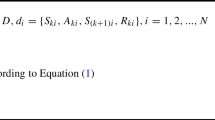Abstract
The paper presents the concepts of a neural control architecture that is able to learn high quality control behaviour in technical process control from scratch. As the input to the learning system, only the control target must be specified. In the first part of the article, the underlying theoretical principles of dynamic programming methods are explained, and their adaptation to the context of technical process control is described. The second part discusses the basic capabilities of the learning system on a typical benchmark problem, where a special focus lies on the quality of the acquired control law. The application to a highly nonlinear chemical reactor and to an instable multi-output system shows the ability of the proposed neural control architecture to learn even difficult control strategies from scratch.
Similar content being viewed by others
Explore related subjects
Discover the latest articles and news from researchers in related subjects, suggested using machine learning.Author information
Authors and Affiliations
Rights and permissions
About this article
Cite this article
Riedmiller, M. Concepts and Facilities of a Neural Reinforcement Learning Control Architecture for Technical Process Control. NCA 8, 323–338 (1999). https://doi.org/10.1007/s005210050038
Published:
Issue Date:
DOI: https://doi.org/10.1007/s005210050038




